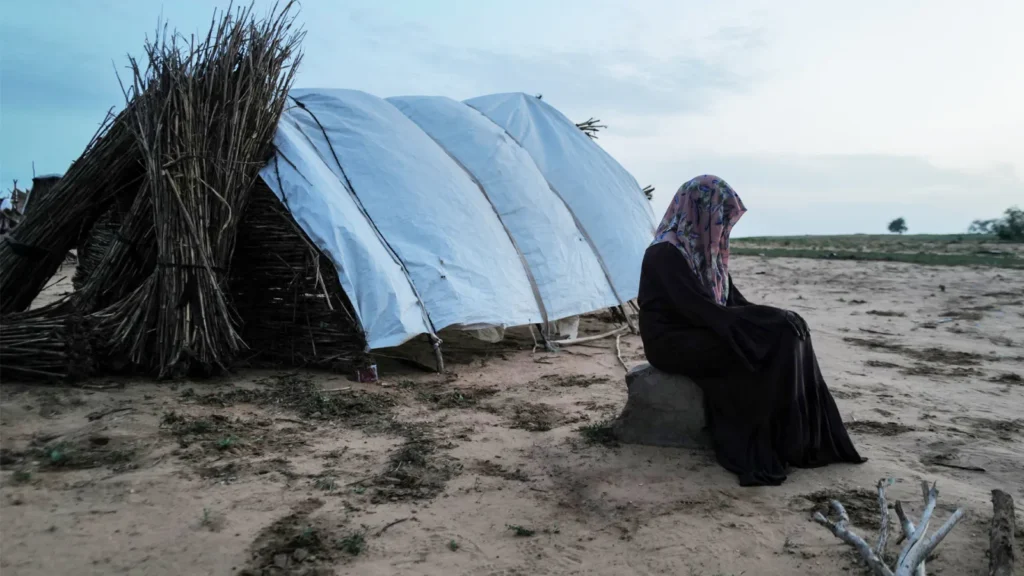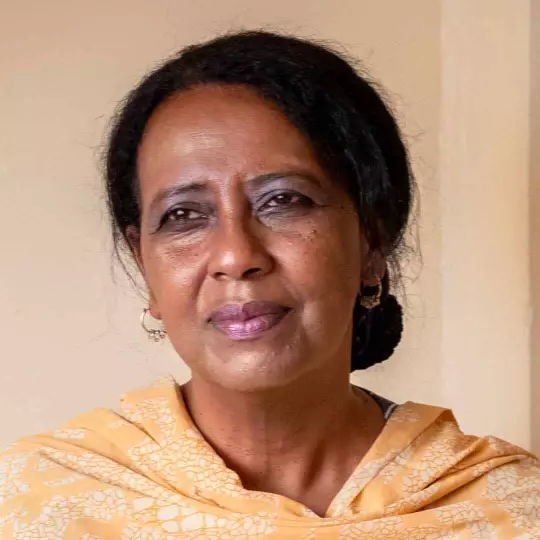
Originally published by The New Humanitarian.

She Said: Women’s lives, women’s voices
You’ve heard it before. Women and girls pay a heavy price during humanitarian crises. She Said is an ongoing collection of reporting in which women offer glimpses of their lives, speaking with TNH from situations of conflict and displacement, and other global emergencies.
KAMPALA
It was midday on 15 April 2023 – the day Sudan’s war broke out – that human rights monitors received reports of sexual violence for the first time. Soldiers from the paramilitary Rapid Support Forces (RSF) had broken into a house and were raping a woman inside.
The woman’s screams for help drew neighbours together, and the perpetrators quickly fled. But attacks continued in the hours that followed – with two more women from the same area gang-raped inside their homes.
Tragically, the attacks have continued ever since.
For over two years, grassroots organisations and women’s groups like mine – the Strategic Initiative for Women in the Horn of Africa (SIHA) – have documented hundreds of reports of sexual violence targeting women and girls in Sudan.
The violence has had a devastating toll across the country, yet there remains a pervasive lack of dedicated international support for survivors, whether it is cash assistance for relocation or the provision of essential services like healthcare.
Many women face psychological trauma – struggling with the heavy burden of shame – yet they have no access to mental health services.
Enormous numbers of women and children are in need of surgical intervention as a result of the violence, yet there is a lack of safe healthcare facilities.
Forced pregnancies due to rape have become increasingly common, but women face enormous difficulties in accessing child delivery facilities, resulting in maternal and newborn mortality.
Without grassroots Sudanese women’s groups – operating both inside the country and in refugee camps – it would not have been possible to understand the gravity of this situation or report human rights violations to international bodies and organisations.
Yet the limited resources available for supporting survivors are mostly funnelled through international organisations, which offer only fragmented funding to local groups.
These local groups are left struggling to meet their communities’ expectations while bearing the strain of simply staying afloat.
What women and girls are facing
Research done by SIHA and other organisations shows that all warring parties – including the Sudanese Armed Forces (SAF), the Joint Darfur Forces, and other militarised groups – have and continue to commit sexual violence.
However, the RSF remains the dominant armed group responsible for these crimes, its fighters wielding it systematically as a weapon of war against civilians throughout the country.
The rate of sexual violence has been the highest in Darfur, the heartland of the RSF. Its fighters and allied militias have gang-raped women in front of their families, while besieging famine-hit communities, and carrying out acts of genocide.
Between January 2024 and March 2025, the medical charity Médecins Sans Frontières said it provided care for 659 survivors of sexual violence in South Darfur state alone. 94% of the cases were women and girls; 15% were aged 5 to 14.
In the past, Darfuri civilians – especially women – could have counted on the UN-African Union UNAMID peacekeeping mission for protection, as it patrolled roads, secured camps, and enabled access to farmland.
But ever since UNAMID’s withdrawal in 2020, violence has significantly escalated in Darfur. In my view, the UN Security Council’s decision to end the mission significantly contributed to the current crisis.
Women in other areas including Al Jazirah, Khartoum, and the Blue and White Nile states have also suffered greatly under the RSF, with many subjected to gang rape, kidnappings, torture, and the looting of their homes, farms, and savings.
Teachers in Al Jazirah report that although some schools have reopened since the RSF left, many abused girls refuse to return to education because they feel ashamed or stigmatised, or just because they are too terrified to leave their homes.
Even when RSF troops withdraw from communities – as they have increasingly in recent months under pressure from the SAF and allied militias – the impact of their abuse endures long after.
Teachers in Al Jazirah report that although some schools have reopened since the RSF left, many abused girls refuse to return to education because they feel ashamed or stigmatised, or just because they are too terrified to leave their homes.
Hundreds of women who survived enforced disappearances by the RSF, meanwhile, won’t go back to their hometowns or speak with their families, who themselves struggle with grief, shame, and an inability to comprehend the trauma of sexual violence.
The enforced disappearances of women and girls represent one of the gravest crimes committed by the RSF. Large numbers have been abducted by troops and either sold into slavery or trafficked to various locations, where they endure forced servitude and sexual violence.
As the RSF has lost territory, SIHA has received large volumes of distress calls from residents requesting assistance for women who are fleeing abandoned farms by rivers and other isolated locations where they were kept for months by paramilitary fighters.
We have confirmed more than 100 cases of women who were liberated from RSF detention after being held at sites near Al Getina, an area north of the town of Kosti.
The stories of these women are horrifying: They were tortured and abused, with some dying from illnesses and injuries as a result of the ordeal, while others died from suicide.
My colleagues and I believe that the true number of abducted and trafficked women during this war is far higher that what is known, as many escaped or were released without assistance – all in a country that lacks established services for survivors.
New infractions
Other new patterns of infraction are also emerging as the dynamics of the war shift.
While the SAF have driven the RSF out of several territories, many women and girls are being subjected to prosecutions by Sudanese military intelligence, who accuse them of being paramilitary collaborators, often using counter-terrorism laws.
These women and girls, often impoverished, were forced to work and likely exploited by the RSF while they controlled the area. Such accusations are very much in line with Sudan’s legal system, which has a longstanding history of criminalising women.
Many of the detained women – which includes activists and members of the pro-democracy movement – have reported instances of sexual harassment and assault during interrogations, while around five were sentenced to death.
The tireless work of grassroots advocates, lawyers, and paralegals has helped reverse two of those sentences and secured the release of several women. Despite enormous obstacles, their commitment to upholding justice remains unwavering.
Justice is a critical element of civilian protection, and the key to demobilising armed actors and reducing the prevalence of violence against women, especially as international peacekeeping and other meaningful global interventions appear unlikely.
Yet these justice workers operate with little to no support. Their organisations lack basic resources, and many legal professionals are unpaid or working in dangerous conditions.
Sudan’s legal system is, meanwhile, on the brink of collapse. Police stations, courts, and local justice mechanisms have all but disappeared, pushing people to seek their own forms of accountability – often with dangerous consequences.
Supporting frontline groups
Rebuilding these systems is urgent. Justice cannot wait for a shift in governance. Supporting lawyers, human rights defenders, and justice infrastructure now is essential to protect civilians – especially women – and give them tools to fight against militarism.
More broadly, extending an effective response to gender-based violence requires having faith in the local groups at the forefront of efforts on the ground, whether that is in refugee camps or in displacement shelters in cities and towns.
Sudanese women are taking enormous risks to communicate human rights violations with little protection or support. Urgent investment is therefore needed in supporting their advocacy, justice, and documentation efforts.
At the same time, other vital community services led by women – like the communal kitchens feeding entire neighbourhoods or the education programmes for children – are barely surviving amid war-driven scarcity and inflation. These lifelines urgently need support too.
Extending an effective response to gender-based violence requires having faith in the local groups at the forefront of efforts on the ground, whether that is in refugee camps or in displacement shelters in cities and towns.
Sudan now hosts over 10 million displaced people – nearly 8 million uprooted since the war began – and more than 4 million people have left the country since April 2023. With women and girls making up over half, the need for investment in protection, reintegration, and aid is immense.
Sudanese women form the backbone of their communities. They drive the local economy as farmers and petty traders and are the main drivers and contributors to the care economy – making critical decisions to protect their families and communities.
Women in besieged areas often risk their lives to smuggle food and medicine into their villages and communities, and they have led efforts to report on human rights violations to international organisations and instruments.
They represent wisdom, truth, and the yearning for justice. They are the true peacemakers, facilitating healing and building bridges between communities. Empowering them is not just necessary – it is the only path to Sudan’s survival
Note: This interview is shared with permission from The New Humanitarian. The content belongs to them and is being republished on our platform to spread awareness on the subject matter.
